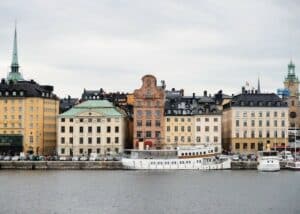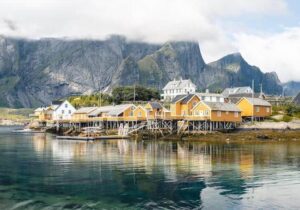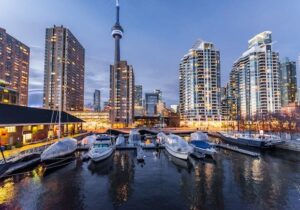You don’t have to remain in your home country when you retire. There are many countries around the world that offer top-notch senior-specific benefits, excellent healthcare, high-quality facilities and low cost of living for retirees.
In this guide, we will be looking at the top 10 countries with the best elderly care in the world where you can enjoy your retirement stress-free, the factors that make countries place high on the retirement index, and the best senior-friendly visas to choose from:
Retirement Index: Factors that Influence Elderly Care
Elderly care ensures that seniors get the support and services they need for a good quality of life. It directly affects their well-being and longevity.
When relocating with elderly care in mind, several factors should be considered, such as healthcare quality, cost of living, accessibility, climate, and safety. A country or city with good medical services, affordable living, and a welcoming community is ideal for retirees.
The Global Citizen Solutions Retirement Index is a useful tool for choosing the best country for retirement and elderly care. The report helps retirees compare different locations based on key factors, including healthcare, cost of living, and safety.
By using this index, retirees can make informed choices about where to live, ensuring their healthcare needs and priorities are met as they age.
Below, we list some of the best countries for elderly care. These places offer excellent medical services, a high quality of life, safety, and strong social integration.
12 Best Countries for Elderly Care
1. Sweden

- Universal healthcare: Sweden is known for its publicly funded care system that is accessible to all residents, regardless of nationality or employment status. It is primarily funded through taxes, offering everything from primary to specialized care.
- Aging in place: Swedes emphasize independence among elderly individuals and those with disabilities, encouraging people to age in their own homes.
- Decentralized social and healthcare systems: The responsibility for financing, organizing and providing services are delegated to the regions and municipalities. The benefit of this is universal coverage and equal access, allowing for local tailoring of services and the maintenance of national oversight when it comes to policies.
- Accessibility: Sweden funds the creation of an accessible society for all, which means reliable public transport services, good housing and home help services.
2. Norway

- Universal welfare: Funded by citizens’ taxes and contributions, elderly care services through universal welfare enables older people to remain at and be cared for inside their homes.
- Generous pension: Norway’s pension system covers everyone over 65, providing older Norwegians with the financial security to provide for themselves when they get hit with age-related illness or injury
- Age-friendly development and reforms: To support its aging populace, Norway emphasizes the building of sustainable and age-friendly communities.
3. Switzerland

This is for a variety of reasons including mandatory universal healthcare system that ensures older people have access to quality medical care as they age. Some highlights include:
- VIA project: Focuses on strengthening the health and well-being of older people in six areas, namely physical activity, fall prevention, mental health, vulnerable groups, counseling and events support, and integration of general practitioners.
- Time banks: Swiss citizens volunteer to help seniors so that they can then later use these so-called “time credits” for help in their old age. This was formulated in anticipation of care shortages in the future.
- Aging in place: Support is given in the form of both formal and informal caregivers to allow older adults to live at home for as long as possible to reduce strain on the healthcare system.
4. Spain

- Affordability: Spain offers free or low-cost universal public healthcare as well as reasonable private healthcare pricing that offers shorter wait times and excellent medical facilities.
- English proficiency: In most major cities and expat areas, doctors and nurses are fluent in English.
- Subsidization: Prescription drugs are subsidized, meaning they’re much cheaper than in most countries in the world.
- Tailored to foreigners: The country has many nursing homes, assisted living facilities, and home care services that cater to the needs of retirees from abroad.
Not only does Spain have tax agreements with many countries to prevent double taxation on pensions, but it also offers a low cost of living.
The country has low crime rates and a reliable infrastructure in the form of well-maintained roads and modern amenities.
The mild Mediterranean climate of Spain is also great for joint pain and the laid-back culture offers a stress-free environment to grow old in.
Foreigners who want to take advantage of the country’s great elderly care can retire in Spain through attractive programs such as the Non-Lucrative Visa Spain. It has been designed with passive income earners, like pensioners, in mind.
5. Portugal

With a strong social welfare system and stable democracy, and Portugal ranking in the top 10 safest countries in the world, this is no surprise.
This expat trend has grown the Portuguese senior care industry by increasing the number of nursing homes, assisted living facilities and in-home care services catering specifically to foreigners.
- Universal Healthcare System (SNS): Portugal offers low-cost or free medical care. Any foreigner who is a legally resident in Portugal can obtain a National Health Service (SNS) user number, which entitles them to medical assistance at public healthcare facilities.
- Expat friendly and affordable: Prescription medication is subsidized and thus cost significantly less than in, say, the United States. There are also many medical professionals who speak English, making the country easily accessible for foreigners to receive elderly care.
Portugal is one of the countries that offer a retirement-specific visa in the form of the Portugal D7 Visa for those who want to grow old in the country.
With an income requirement of around €820/month (€9,840/year), you can sit back and relax while benefiting from the country’s elderly care benefits. You can apply for citizenship after 5 years of residency.
6. Costa Rica

In addition, it is a stable country when it comes to having a reliable Infrastructure, meaning there’s clean water, good roads, and modern amenities for citizens and foreign retirees alike.
There are many English-speaking doctors who have been trained abroad working in Costa Rica. Prescription medication is quite cheap, and the public healthcare system provides comprehensive care at a low cost for legal residents.
Daily expenses like utilities, groceries and transportation are reasonably priced and assisted living facilities are much more affordable than other countries in the world.
Foreign retirees benefit from the Costa Rican tax system as they are only taxed on income generated in the country and not foreign income. Social Security and pension from your home country is thus safe from taxes.
Retiring in Costa Rica to benefit from the country’s elderly care is easy with their Pensionado Visa. All you need is an average income of $1,000 per month from a pension and you can gain access to the public healthcare system for a small monthly fee.
7. Uruguay

In addition, expats have access to Uruguay’s public healthcare services provided they have obtained legal residency.
The country has well-equipped and modern medical facilities with many English-speaking doctors who have been trained in Europe and the United States. Prescription drugs are also reasonably priced.
When it comes to safety, it is one of Latin America’s safest countries with low crime, political stability and a strong democracy. In addition, Uruguay has good public services, clean water and modern amenities.
The country boasts a temperate climate and relaxed lifestyle, ideal for seniors. Cost of living is low when it comes to housing, food and transportation and there’s no tax on foreign retirees’ pensions or Social Security coming from abroad.
Just like Costa Rica, retiring in Uruguay to get some of the best elderly care in the world is simple with the country’s Pensionado Visa. All that’s required is to show you have a stable income for a pension with no minimum requirement. This visa gives you access the country’s Mutualista system and citizenship after 3 to 5 years of residency.
8. Mexico

Over the years it has become a medical tourism hub with many foreigners traveling to the country for dental work, surgeries and long-term treatments. The country is continuously investing in the latest medical procedures and technology.
There are even quite a few international hospitals in Mexico City, Guadalajara, and Mérida that cater specifically to expatriates. Another benefit for foreign retirees is Mexico’s affordable in-home nursing and assisted living services.
When it comes to cost of living and housing, Mexico is a top destination with expats settling in budget-friendly retirement communities across the country.
Mexico is also known for its mild climate that is ideal for senior citizens and a relaxed lifestyle for stress-free retirement.
While Mexico doesn’t offer a visa specific to retirees, there is the option of the Permanent Residency Mexico permit if you want to receive your elderly care in this country. There are public and private healthcare options available and path to citizenship after 5 years of staying in the country.
9. New Zealand

The country offers government-funded universal healthcare coverage, meaning low-cost or free healthcare services for citizens and residents alike. Long-term visa holders are covered by this so it’s good to keep in mind when consider New Zealand as an option for elderly care.
With New Zealand being renowned for its high acceptance of expats and migrants, the country is ideal for English-speaking foreign pensioners to retire in.
When it comes to tax, there is a flat tax system on foreign income with a favorable tax regime for retirees. In comparison to the United States and Western European countries, New Zealand’s cost of living is low, especially in rural areas and towns.
10. Italy

- Universal healthcare: This system offers great elderly care and covers both citizens and foreign residents.
- Social security: The country offers social security, which includes a state pension, and a companion allowance (Indennità di accompagnamento).
- Favorable tax regime: Italy offers a flat-tax system on foreign income, making it an attractive destination for those seeking tax optimization strategies as they age.
English proficiency is relatively high, meaning smooth integration possibilities for English-speaking retirees.
When it comes to safety, Italy is considered one of the more peaceful countries in the world.
If you’d like to retire in Italy and take advantage of its elderly care benefits, you can apply for the Italy Elective Residency Visa. This visa stipulates no working while in the country with an income requirement of around €31,000 per year or around €38,000 if you’re bring a spouse along.
11. Canada

Immigrants are eligible for this health care coverage, albeit with a 90-day waiting period in some Canadian provinces.
Canda offers various financial assistance programs for elderly citizens to help them maintain a decent standard of living as they age. These can include:
- Old Age Security (OAS): a monthly payment you can qualify for if you’re 65 years of age and older.
- Guaranteed Income Supplement (GIS): This add-on to the OAS (see above) provides a non-taxable monthly payment specifically for low-income seniors.
When it comes to integration, Canada is great when it comes to cultural sensitivity. Canadian citizens make sure to care for old age pensioners in a way that is sensitive to their needs and cultural traditions, which helps limit potential discrimination while receiving elderly care.
12. Ireland

Ireland has implemented policies that create age-friendly environments including accessible public transport, housing adaptations and community support. These help seniors to live independently for as long as possible and can engage in social activities to prevent the isolation that tends to come with old age.
The country offers a variety of senior-friendly support in the form of non-contributory state pension, fuel allowance and household benefits, free travel schemes, a medical card for over-70s and more.
Frequently Asked Questions About the Best Elderly Care Worldwide
Which Countries Have the Top Elderly Care in the World?
Countries like Norway and Sweden are often praised for their robust elderly care systems. This is due to their comprehensive social support systems and safety nets as well as high-quality healthcare.
Where Are the Best Assisted Living Facilities in the World?
Countries like the United States, France, Sweden and Canada all have some of the most reputable assisted living programs.
This is due to various factors including skilled nurses, having various types of specialized facilities to provide for diverse needs, and having a good mix of 24-hour healthcare and independent living options.
How Do I Compare Elderly Care Options Across Countries?
Look at:
- Cost of care
- Quality of care
- Government regulation and monitoring of care facilities
- Staff training and qualifications
- Culture and language
- Social and recreational activities
- Safety and security
- Cost of living
- Visa and residency requirements
Is Elderly Care Affordable in Countries with High Standards of Living?
Countries with high standards of living have robust healthcare and social care systems so they can be attractive options but there are usually substantial costs associated with elderly care.

 Gizane Campos
Gizane Campos


